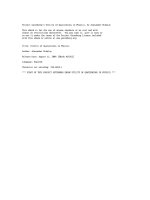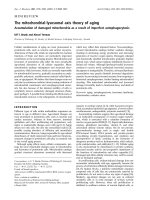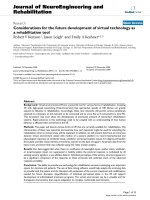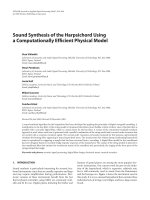The Project Gutenberg E Book of The Argentine as a Market, by N. L. Watson potx
Bạn đang xem bản rút gọn của tài liệu. Xem và tải ngay bản đầy đủ của tài liệu tại đây (500.75 KB, 199 trang )
The Project Gutenberg EBook of The
Argentine as a Market, by N. L. Watson
This eBook is for the use of anyone
anywhere at no cost and with
almost no restrictions whatsoever. You
may copy it, give it away or
re-use it under the terms of the Project
Gutenberg License included
with this eBook or online at
www.gutenberg.org
Title: The Argentine as a Market
Author: N. L. Watson
Release Date: May 16, 2012 [EBook #39715]
Language: English
*** START OF THIS PROJECT GUTENBERG EBOOK
THE ARGENTINE AS A MARKET ***
Produced by Adrian Mastronardi, René
Anderson Benitz, and
the Online Distributed Proofreading Team
at
(This file was
produced from images
generously made available by The Internet
Archive/American
Libraries.)
TRANSCRIBER’S NOTE: OBVIOUS TYPOS HAVE
BEEN AMENDED. VARIATIONS IN SPELLING IN
THE ORIGINAL TEXT HAVE BEEN RETAINED,
EXCEPT WHERE USAGE FREQUENCY WAS USED
TO DETERMINE THE COMMON SPELLING. THESE
AMENDMENTS ARE listed AT THE END OF THE
TEXT. MINOR PRINTER ERRORS HAVE BEEN
AMENDED WITHOUT NOTE. MISSING PAGE
NUMBERS ARE DUE TO THE REMOVAL OF BLANK
pages.
PUBLICATIONS OF THE UNIVERSITY
OF MANCHESTER
ECONOMIC SERIES—No. IX.
GARTSIDE REPORTS ON INDUSTRY AND
COMMERCE. No. 6.
The Argentine as a Market
SHERRATT & HUGHES
Publishers to the Victoria University of Manchester
Manchester: 34 Cross Street
London: 60 Chandos Street, W.C.
Market
A REPORT
To the Electors to the Gartside
Scholarships on the Results of a Tour in
the Argentine in 1906-7
BY
N. L. WATSON, B.A.
Gartside Scholar
MANCHESTER
AT THE UNIVERSITY PRESS
1908
UNIVERSITY OF MANCHESTER PUBLICATIONS
No. XXXIII.
THE GARTSIDE REPORTS.
The Gartside Reports are the reports made
by the Gartside Scholars at the University
of Manchester. The Gartside Scholarships
were established in 1902 for a limited
period, by John Henry Gartside, Esq., of
Manchester. They are tenable for two
years and about three are awarded each
year. They are open to males of British
nationality who at the date of the election
shall be over the age of eighteen years and
under the age of twenty-three years.
Every scholar must enter the University of
Manchester for one Session for a course
of study approved by the electors. The
remainder of the time covered by the
Scholarship must be devoted to the
examination of subjects bearing upon
Commerce or Industry in Germany or
Switzerland, or in the United States of
America, or partly in one of the above-
mentioned countries and partly in others,
but the electors may on special grounds
allow part of this period of the tenure of
the Scholarship to be spent in study and
travel in some other country or countries.
It is intended that each scholar shall select
some industry, or part of an industry, or
some business, for examination, and
investigate this comparatively in the
United Kingdom and abroad. The first
year’s work at the University of
Manchester is designed to prepare the
student for this investigation, and it partly
takes the form of directed study, from
publications and by direct investigation,
of English conditions with regard to the
industrial or commercial subjects upon
which research will be made abroad in
the second year of the scholarship.
Finally, each scholar must present a
report, which will as a rule be published.
The value of a Scholarship is about £80 a
year for the time spent in England, £150 a
year for time spent on the Continent of
Europe, and about £250 a year for time
spent in America.
EDITOR’S NOTE.
Mr. N. L. Watson’s sudden departure to
fill a commercial position in the East has
prevented him from seeing this Report
through the press himself.
TABLE OF CONTENTS.
PAGE.
Chapter I. The
Economic
Basis of the
Argentine 1
" II. The Railways 6
" III. Industries and
the Labour
Question 12
" IV. Foreign
Capital and
Public Debt 16
" V. Argentina
from the
Immigrant’s
Standpoint 20
" VI. English
Trade. Its
Position
and
Prospects 25
" VII. The Tariff 41
Statistical Appendix 53
CHAPTER I.
T H E E C O N O M I C
B A S I S O F T H E
A R G E N T I N E .
The first thing that strikes the new arrival
in the Argentine, and the last thing that he
is likely to forget when he leaves the
country, is the extraordinary inflation of
prices. With the exception of meat, and
perhaps bread, there is no article of
common consumption which does not cost
considerably more than in England, every
allowance being made for freight and
tariff charges. The reason for this excess
is doubtless to be found in the
concentration of trade in the capital. All
imports, for reasons that will be dealt
with later, pass through the hands of the
large houses in Buenos Aires, who act as
sole agents for the whole of the Republic
north of the Rio Negro. [While, owing to
the precarious nature of all business,
dependent entirely on the grain and cattle
yield, much higher prices are charged in
fat years than would be justified if these
times of prosperity were regarded as
permanent.] Because of this concentration
of business in the capital, and in the centre
of the town in particular, rents have risen
to an immense extent, greatly increasing
all establishment charges, and in turn the
price of commodities sold—a cause
which acts again of course in retail trade
and neutralises the freight charges to
outlying districts. But the essential fact in
Argentine Economics, and one which
seems more than obvious, but apparently
escapes the comprehension of Argentine
legislators, is that the country is naturally,
and must remain for some considerable
time, a producer of raw material
exclusively. The country is still
considerably under-populated for the
development of its natural resources,
while only a small portion of the settled
area is yet producing even half the yield of
which it is immediately capable.
Immigration of a certain class—capable
agriculturalists with some capital—is still
required. But with a strange perversity
politicians have persistently advocated a
high protective tariff for the purpose of
fostering industrial development. The
result has been that certain industries have
cropped up under this system, which are
quite incapable of independent existence,
and, while satisfying neither the
employers nor their men, constitute a very
heavy drain on the national purse. The
chief objection, however, to the policy is
that it invites a class of immigrant who is
really not required in the country and who
has taken to settling in the capital instead
of scattering into the camp.
The immigrant required is the “colonist,”
to whom the country is already beginning
to owe much of its prosperity. There are
two distinct types of colonist—the one
who buys his land on a permanent colony,
and builds a decent house, and the
temporary tenant whose economic
principle is to break the soil of new land,
and moves to a new district at the end of
his term. The latter owes his origin to the
cultivation of “alfalfa,” the wonderful
clove-like plant that will grow on sand,
and requires no rain, but thrives on the
surface water which abounds in the
country’s flat, low-lying plains. Alfalfa
will not grow in hard unbroken ground,
and where the land is such, cereal
cultivation is necessary for three years to
reduce it to a fit condition. This work
requires labour which is not available
among the gauchos, the horsemen who act
as hands on the estancias, and the
estanciero himself probably does not
possess the knowledge requisite for the
cultivation of grain. A contract is
therefore made with colonists, usually
Piedmontese or Basques, to break the soil
and grow cereals for three, or more
usually five, years, either at a fixed rent or
for a percentage of the crop, the
stipulation being that with the last year’s
seed alfalfa is sown as well. When the
last crop has been cut, the latter grows
through the stubble. The growth of this
plant is such that as alfalfa is more
cultivated, the stock-bearing capacities of
the country will easily be trebled.
The main supports of the country are,
therefore, cereals and cattle, the latter
being undoubtedly the more profitable
investment, but requiring a much larger
capital. By Argentine, as by French, law
property at death is compulsorily divided,
and this tends to split up the now immense
tracts of land occupied by individuals.
Whatever the social advantages of such a
system may be, it is not conducive to the
most economic working, nor yet to the
breeding of the finest strains of stock, for
which a large capital is required. A form
of evasion, however, has been found in the
formation of limited liability companies,
often private, to run big estancias. These
have everything to recommend them from
the economic point of view. A capable
manager is put in charge of the work on
the spot, and, as capital is usually
forthcoming, the estancias are run in such
a way as to yield the greatest possible
return. They are usually well-maintained,
up-to-date in management and fittings, and
supplied with good home-bred strains.
There are, however, other natural sources
of wealth in the Argentine; notably, the
forests of hard-woods (of the acacia
order) which abound in the Chaco, in
Corrientes and Entre Rios, and are also
found in the province of Córdoba and
elsewhere; the sugar industry in the north-
west (of which more will be said under
“The Tariffs”); the hitherto undeveloped
fruit cultivation in all parts of the country
(this in the sub-tropical and central
provinces would be especially liable to
suffer from the depredations of locusts);
perhaps, too, cotton growing in the Chaco,
where, however, the supply of labour is
much questioned, and some pests peculiar
to the cotton-bole are reported as existing;
and, lastly, the minerals, as yet wholly
undeveloped. Although these are
undoubtedly much more scarce than in
Bolivia and Chile, the absence of an
impartial geological survey has rendered
the flotation of bogus companies easy, and
practically prevented any genuine
development, in spite of their greater
accessibility than in the former country.
The recent boom and collapse in gold
ventures was the result of stock exchange
transactions, probably fraudulent, as, with
the exception of the sea-bed to the very
south of the country (where it cannot be
recovered), gold is probably one of the
few minerals which does not exist to a
workable extent.
A curious feature in the Argentine is the
absence of navigable rivers. With the
exception of the treacherous Paraná and
the Uruguay, enclosing the provinces of
Entre Rios and Corrientes, there is not a
single waterway, natural or artificial. The
result of this has been an enormous
network of railways spreading over the
central provinces with isolated offshoots
north and west. The consequent great
influx of capital would naturally have
encouraged a large import trade; but the
prohibitive tariff has succeeded in
retaining the money in the country, while
the revenue derived has, almost without
exception, been uneconomically
employed. The result is that, apart from an
occasional monopoly that has succeeded,
the only large gainers from this policy
have been the town property holders.
A large part, however, of the province of
Buenos Aires is liable to periodic
inundation, and, to obviate this, an
extensive system of drainage has been
planned, a work of great difficulty owing
to the small difference of altitude between
the land and the sea. Some canals,
however, are in course of construction of
which advantage might possibly be taken,
if they were made of sufficient depth, for
local transport. If this were done, a large
and important part of the country would be
provided with a cheaper alternative to the
railway. In a volume descriptive of the
Republic (published, in English, by the
Department of Agriculture) this possibility
is foreshadowed, stress being laid on the
slight fall from the Andes to the coast, and
a scheme, chimerical on the face of it, of a
system of trans-continental canals is
vaguely outlined. But, being so wildly
improbable, it seems to have no existence,
even problematical, outside the pages of
that advertisement.









